Key takeaways
- Deontology emphasizes doing what is right based on ethical principles rather than the outcomes, fostering moral discipline and integrity.
- In education, applying deontological principles enhances fairness and honesty, cultivating students’ moral responsibility alongside knowledge.
- Practicing deontology in the workplace, despite pressures, builds a culture of trust and respect through consistent ethical decision-making.
- Integrating deontological practices daily involves self-reflection, open communication about values, and recognizing the significance of small ethical actions.
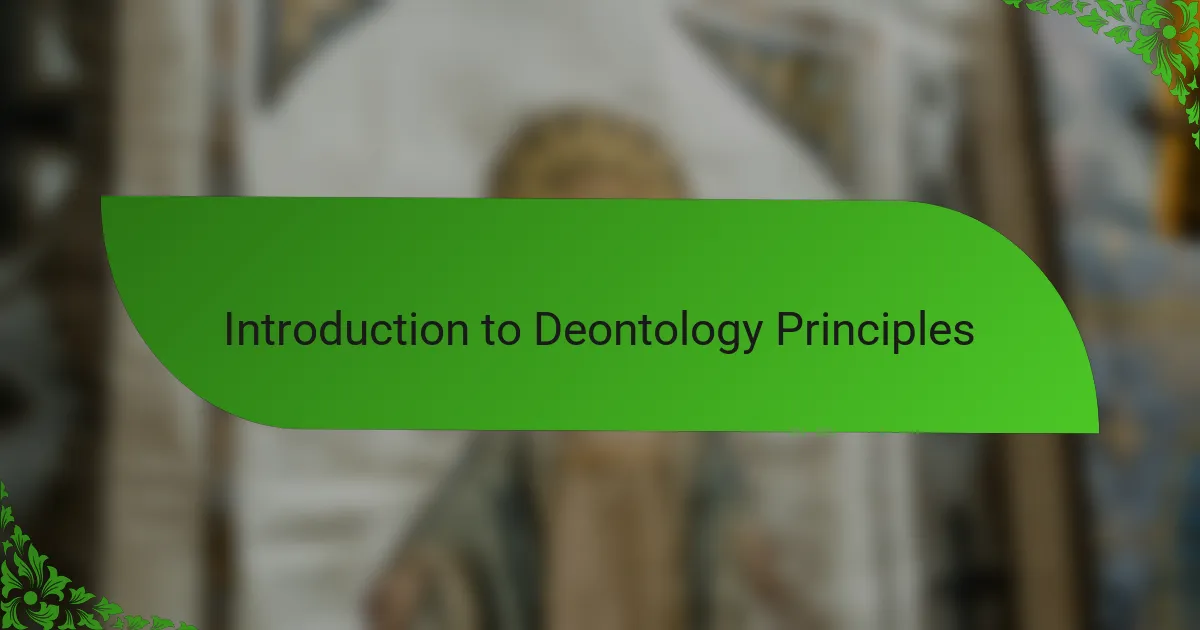
Introduction to Deontology Principles
Deontology, at its core, is about doing what’s right because it’s right—not because of the outcome it produces. This principle has always struck me as both comforting and challenging. Have you ever faced a moment where doing the “right” thing felt tough simply because the result might not be ideal?
I remember early in my career when I had to make a decision strictly based on ethical rules, even though bending them seemed easier or more beneficial. That experience taught me that deontology demands a kind of moral discipline that doesn’t waver with circumstances. It’s about commitment to duty and the integrity of our actions.
What I find most fascinating about deontology is its focus on intention over consequence. Isn’t it reassuring, as well as a bit unsettling, to be judged not by what happens but by what you intended? This idea has deeply influenced how I approach decisions in my job, reminding me that principles can’t be sacrificed for convenience.

Applying Deontology in Philosophy Education
Applying deontology in philosophy education means emphasizing the importance of adhering to ethical duties when teaching and assessing students. I recall times when I had to grade a student’s work impartially, even if they were a friend or someone I felt sympathy for. It wasn’t always easy, but staying true to fairness upheld the integrity of the learning environment.
Have you ever wondered how sticking strictly to ethical principles might shape your teaching style? For me, it created a framework where honesty and consistency took center stage, which students gradually came to respect. This approach reinforced that the role of an educator isn’t just to impart knowledge but to model moral responsibility.
In practice, applying deontology also meant crafting assignments that challenged students to think beyond consequences and focus on the morality of actions themselves. Watching students wrestle with these ideas, struggling yet growing, made me appreciate how powerful this moral framework can be in shaping thoughtful, principled thinkers.
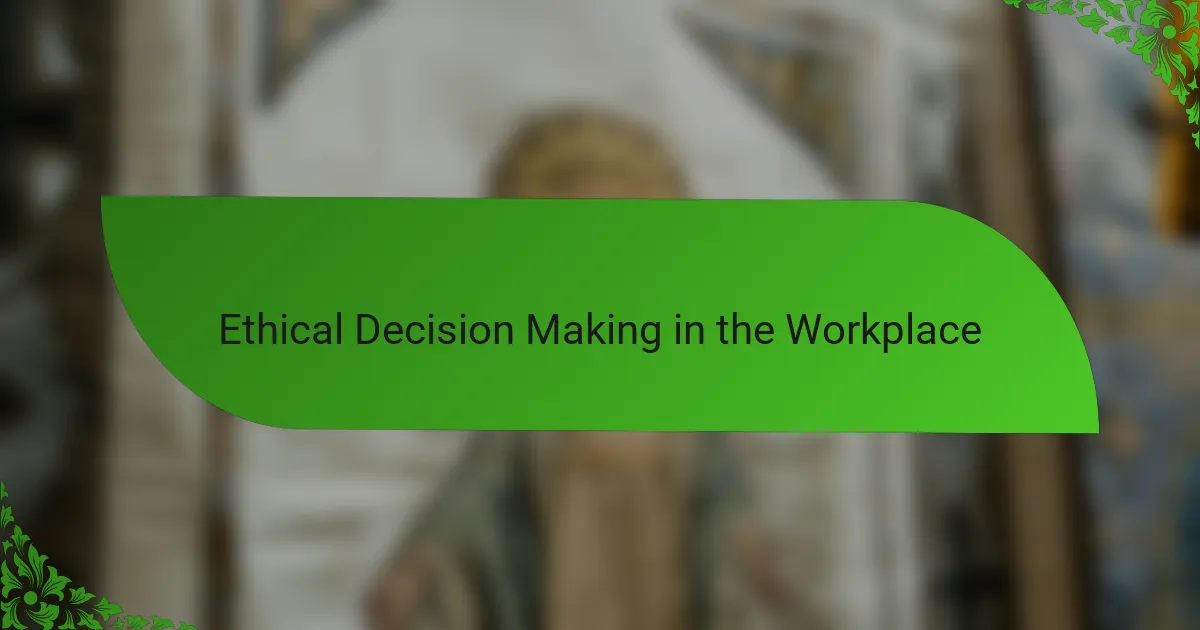
Ethical Decision Making in the Workplace
Ethical decision making at work often puts our commitment to principles to the test. I remember once facing pressure to cut corners on a project deadline. Choosing to follow the established rules wasn’t the easiest path, but it felt essential to honor my duty—even though it meant extra effort and no immediate reward.
Have you ever found yourself torn between what’s right and what’s convenient in a professional setting? For me, this tension highlighted how deontology serves as a reliable compass, especially when outcomes are uncertain or unpopular. It reminds me that integrity isn’t about winning approval; it’s about being faithful to ethical commitments.
What strikes me most about practicing deontology at work is how it shapes everyday choices—like honesty in communication or fairness in collaboration. These decisions might seem small, but they build a culture where trust and respect thrive, which I believe is the true measure of ethical leadership.

Examples of Deontological Practice at Work
One vivid example from my work involves refusing to share confidential information, even when it felt like doing so could have smoothed over a difficult situation. Did I ever question if protecting privacy would cause more harm than good? Absolutely. But sticking to that duty reinforced my belief that some ethical lines simply cannot be crossed without compromising who we are.
Another time, I witnessed a colleague tempted to manipulate data to meet targets. I felt a surge of responsibility to intervene, because letting dishonesty slide wasn’t an option for me. It felt uncomfortable confronting the issue, yet upholding truthfulness was something I couldn’t negotiate, no matter the pressure.
Even in everyday interactions, I’ve practiced deontology by being consistently truthful, even when white lies seemed easier or less awkward. Have you noticed how such small choices reflect our deeper commitments? For me, these moments add up, cultivating a work environment grounded in respect and principled actions rather than convenience.
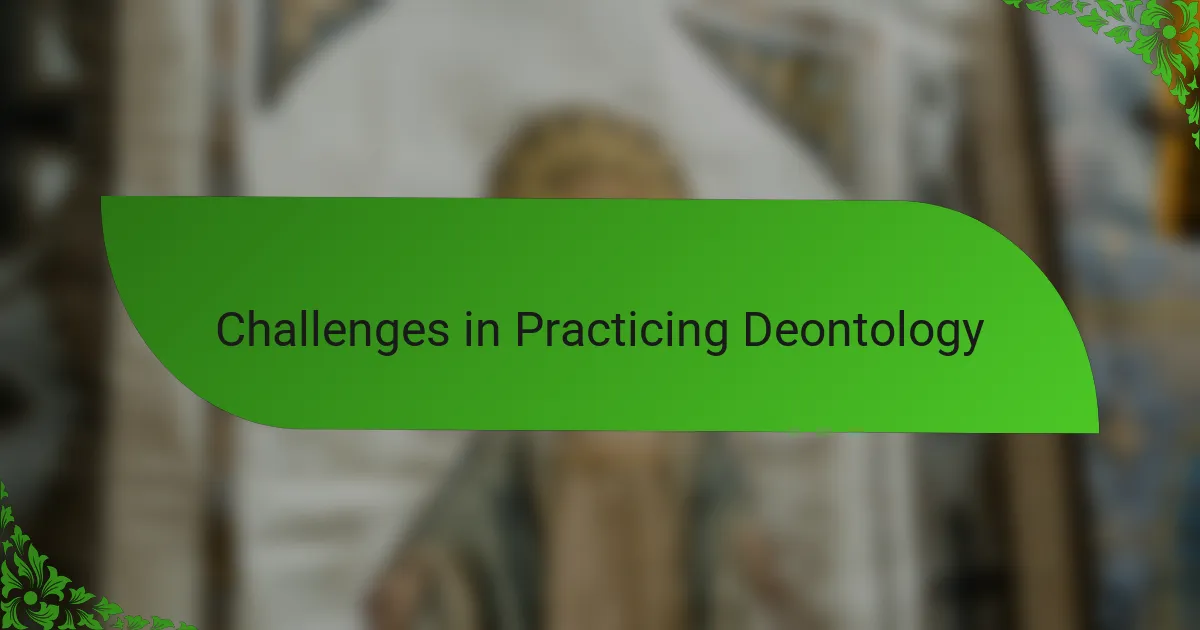
Challenges in Practicing Deontology
Sticking to deontological principles isn’t always straightforward—especially when external pressures push you toward shortcuts. I recall feeling torn during a project when deadlines loomed, and bending rules could have sped things up. Have you ever experienced that nagging doubt, wondering if being strictly ethical might cost you more than you’re ready to pay? That tension can weigh heavily, testing not just your resolve but your confidence.
Sometimes, the challenge lies in dealing with conflicting duties. Once, I faced a situation where two ethical rules seemed to pull me in opposite directions, leaving me unsure which path upheld my moral obligations best. It felt like walking a tightrope without a safety net. How do you prioritize when every choice feels equally right and wrong? Wrestling with these dilemmas made me realize that deontology demands not just following rules, but thoughtful reflection on what those duties truly mean.
Moreover, practicing deontology can sometimes isolate you professionally. When colleagues opt for pragmatic solutions that bend ethical guidelines, choosing to adhere strictly can make you stand out—in uncomfortable ways. I’ve encountered moments where insisting on doing the “right” thing felt like swimming against a strong current. Have you ever felt that discomfort, knowing you’re the odd one out because you refuse to compromise your principles? This solitude is part of the price paid for moral integrity, but it also strengthens one’s character over time.
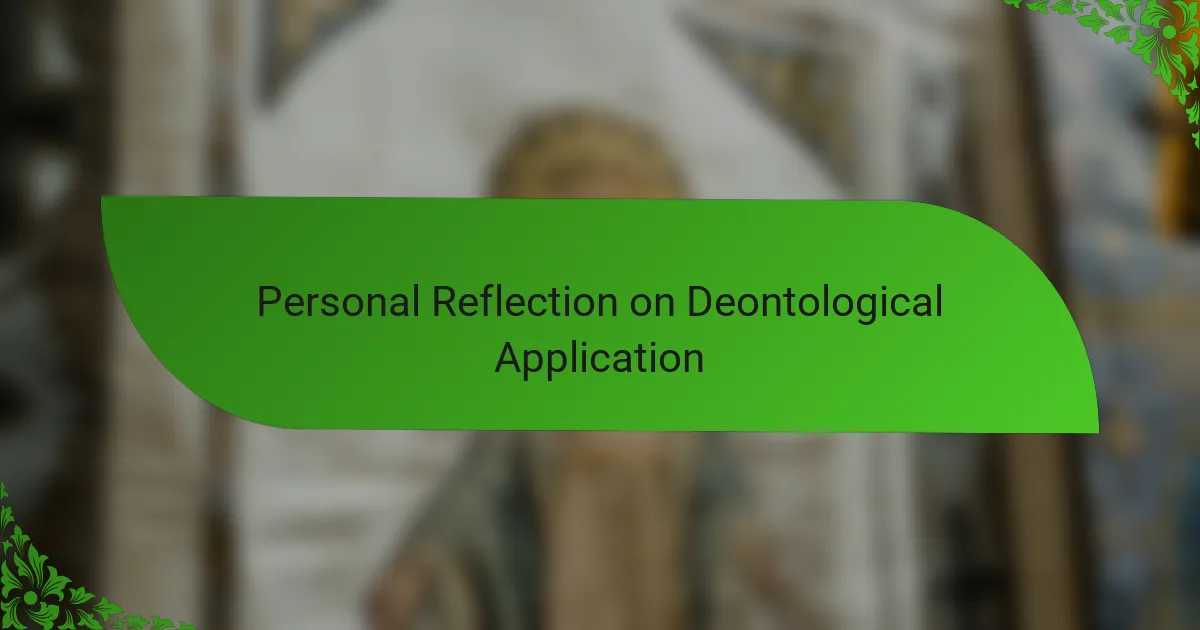
Personal Reflection on Deontological Application
Reflecting on my day-to-day work, I realize that practicing deontology isn’t just about following rules rigidly—it’s about cultivating an inner sense of duty that guides every choice, even when no one’s watching. Have you ever experienced that quiet moment of doubt before a decision, where your principles whisper louder than convenience? Those moments have deepened my understanding of what it truly means to be ethically accountable.
There was a time I hesitated before reporting a minor but ethically questionable act by a teammate. I questioned if disrupting harmony was worth it. Yet, remembering Kant’s notion that our actions must be universally justifiable helped me overcome that hesitation. It taught me that deontology invites us to take responsibility not just for outcomes, but for the moral fabric of the workplace itself.
Sometimes, I feel the weight of being the “ethical anchor” in my team—a role that can feel isolating but also deeply rewarding. Does standing firm in duty, especially when others don’t, ever make you feel like an outsider? I’ve found that this steadfastness, though challenging, ultimately builds trust and respect, proving that integrity is its own kind of leadership.
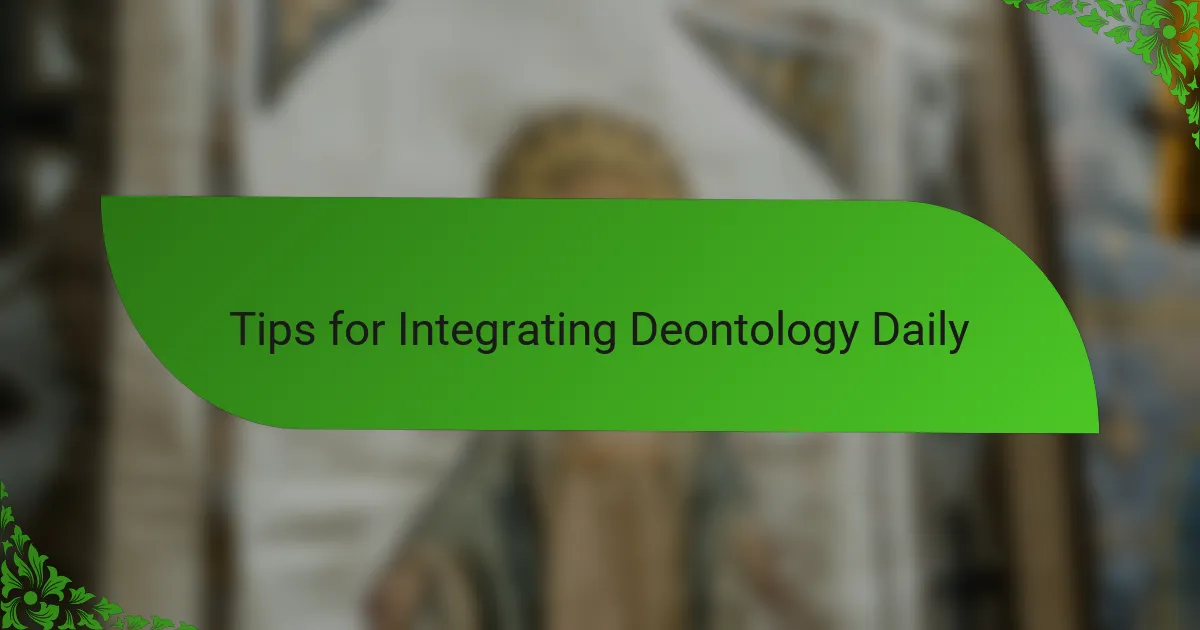
Tips for Integrating Deontology Daily
One tip I’ve found invaluable is to start each workday with a quick mental check-in: What duties am I committed to today, regardless of the possible outcomes? This habit helps me center my decisions on principle rather than convenience, especially when the pressure to cut corners creeps in. Have you tried such a mindfulness pause before jumping into tasks?
Another approach I embrace is being transparent about my ethical commitments with colleagues. When I openly communicate my deontological stance, it often sparks deeper conversations about shared responsibilities and fosters a culture where moral duties are visible, not hidden. In your experience, can openness about values shift workplace dynamics for the better?
Lastly, I remind myself that small actions matter—a truthful response in a tricky conversation or refusing to overlook minor rule-breaking sets a tone that ripples throughout the day. While these moments may seem insignificant, they accumulate into a sturdy framework of integrity. How often do you notice how these “everyday” choices quietly shape your professional identity?